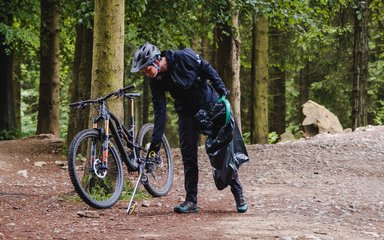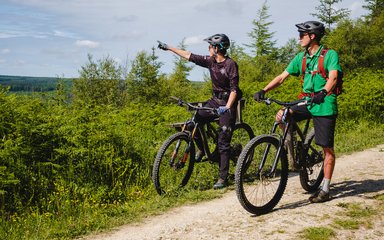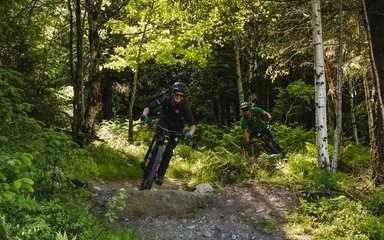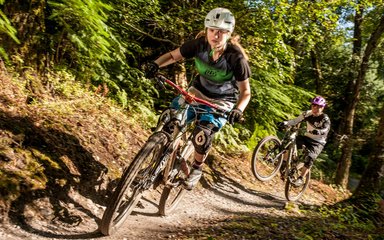
We’re working with our partner, Trash Free Trails and their A-TEAM to raise awareness of single-use pollution, or litter, on our forest trails and inspire everyone to be help us to tackle this wide-spread problem.
Trash Free Trails aims to reduce single-use pollution on trails and wild places by 75% by 2025. They’re doing this with the help of a passionate group of volunteers - riders, runners and roamers who are dedicated to making a positive impact on their trails and in their communities.
We manage over 2,500km of cycling trails and we want to inspire people to take care of these special places. Our partnership aims to show everyone that, by taking some simple steps, they can do their bit to take care of these special trails and connect more deeply with the forest.
In a new video, Dom, our Cycling Ranger based at Dalby Forest, and Rosie, a member of Trash Free Trails’ A-TEAM, highlight the problem of single-use pollution on our trails and offer some tips on simple ways we can all make a difference.

What do we know about the impacts of single-use pollution on wildlife?
Up to 23 times more plastic escapes into terrestrial ecosystems than our oceans, but we understand less about the impact. Trash Free Trails State Of Our Trails research project is looking to gain a scientific understanding of the causes and impact, using data provided by volunteers like Rosie about the litter they collect:
“Anecdotally, when we’re picking litter we find that it’s been chewed by animals or carried by birds. Or sometimes unfortunately we do find animals entangled in or killed by that litter, so it really is a problem.
We see it throughout the country, not just in specific areas. It’s the usual suspects – crisp packets, drinks cans and bottles, things that are used once and then discarded.”
What are some of the patterns of where litter is found on trails and in the wider forest?
Dom: “As you might expect there are hotspots are around major visitor hubs and car parks, but there’s often also litter to be found at the trail head junctions where people might stop. We also find litter on some of the start climbs where it falls out of pockets when they’re taking a break to adjust ahead of the climb.


Would having more bins help?
Rosie: “Putting in more bins doesn’t solve the problem. Wildlife is clever and knows that bins mean an easy meal. It’s also not an issue of having nowhere to put litter but the whole lifecycle of the product.”
Dom: “That’s why we ask people that come to the forest to think about what they bring and the products they use – reducing, reusing and recycling – and to leave no trace.
A simple tip is to dedicate a pocket of your backpack for any litter or to bring a separate bag to put in your backpack. We have bins around main visitor hubs, and you can then throw anything away later.”
Small steps we can all take
- Think about what you bring, for example refillable bottles or camelbacks, reusable containers or beeswax wraps for food, fruit that comes in its own ‘wrapper’, and reusable cups for the cafe
- Designate a section of your pack for litter
- Pick up a bit of extra litter while you’re out walking or riding
- Get involved in an organised trail clean
- Encourage others to play their part

Forests care for us. We care for forests.
Our forests give so much: a place for us to escape, have fun and connect with friends, a home for a diverse range of wildlife, sustainable timber and are a vital part of combatting climate change. In return, we need to protect and care for them by minimising our individual impact and making any impact we do have a positive one.
Rosie: “It might feel weird to pick up other people’s litter, but no one else will. By doing it, we make it safer for wildlife and nicer for people who come along after us.”
Dom agrees: “It feels rewarding picking up litter from a trail – like leaving a place better than when you found it.”
Take a moment to think about the little things you can do and together we can make a big difference – now and for future generations.



